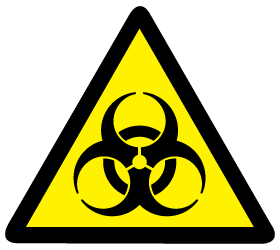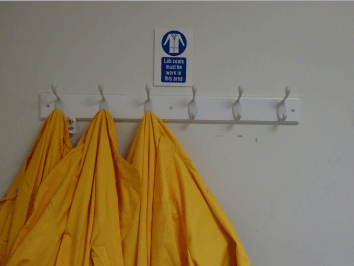Many companies operate with the risk to health from exposure at work to biological agents. These bacteria, viruses, parasites or fungi can cause biological infection, ranging from mild discomfort to acute or even chronic health issues. Therefore, it is imperative that such biohazard risks are identified, fully assessed and controlled.

Much of the legislation covering biological safety stems from the Control of Substances Hazardous to Health (COSHH) 2002 and The Management of Health and Safety at Work Regulations 1999, and lays the foundation for effective measures to minimise or eliminate biological risks to human health.
Many health and safety measures to prevent biological infections can include controlling the following;
- Personal hygiene. To encourage regular washing of hands, and where practical supplementing with the use of hand sanitisers.
- First aid. All open wounds such as cuts, scratches or grazes should be washed and treated, before being covered with protective, waterproof dressings. Eye wash or emergency shower facilities.
- Rest areas. All meal breaks should be taken remotely away from the work area.
- Cross contamination. Avoid the transfer of infection from hands by contact to eye, mouth or nose.
- Protective clothing. Appropriate personal protective equipment (PPE) should be worn to eyes (visors face shields or goggles), breathing (masks or respirators), ears (ear protectors), hands (gloves or gauntlets), body (aprons, gowns, lab coats or overalls), and feet (overboots).
- Waste disposal. Contaminated waste, substances or clothing should be disposed of safely.
- Housekeeping. Work equipment and work surfaces should be cleaned and decontaminated, which may include sterilizing or autoclaving in some sectors.
- Building maintenance. Air conditioning should prevent build up or circulation of dusts or liquids, water supply should be checked for micro-organism growth (legionella), and adequate ventilation
- Pest control. To prevent bites and infection from waste from pests, insects or animals.
- Protection from injury by sharps. To prevent the piercing of skin from needles or broken glass.

It is the employers’ responsibility to identify any of the risks and accompanying preventative actions necessary as outlined above. At Label Source we supply a comprehensive range of health and safety signs to promote good practice and endorse sound operating procedures. These include biological hazard warning signs, labels and tapes; mandatory safety signs including personal protection ranges; prohibition safety signs; first aid signs; and waste management signs.
Our customers include:
- Clinical or biomedical scientific research laboratories.
- Healthcare, including hospitals, health centres, dental surgeries, social care, chiropodist or acupuncture practices, and associated services, such as porters, cleaners and laundry workers.
- Animal welfare, such as veterinary practices, zoos, farms, kennels, catteries and stables.
- Social services including, social workers, care workers and custodial services (police or prison services).
- Horticultural services such as groundsmen, gardeners and park keepers.
- Waste services including refuse collectors, sewerage workers, ditch cleaners and sludge removers.
- Other services including undertakers, grave diggers, poultry processors, abattoirs, butchers, tattooists, hairdressers and beauticians.
For more information on the product ranges available on biological hazards please visit our website www.labelsource.co.uk or contact us by e-mail on sales@labelsource.co.uk for further information.